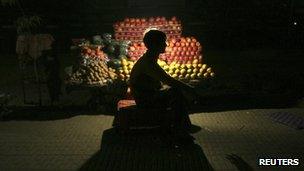India MPs in uproar over retail reform plans
- Published

Will the deal leave smaller retailers in the dark?
There has been uproar in India's parliament over the cabinet's decision to open up the retail market to global supermarket chains.
One key government ally, the Trinamool Congress, joined opposition parties in shouting slogans and unfurling banners.
The lower house had to be adjourned, and Trade Minister Anand Sharma instead held a press conference to spell out details of the policy.
He said the "India-specific" scheme would create tens of millions of jobs.
The cabinet's move allows 51% foreign direct ownership (FDI) of multi-brand retail stores, allowing groups like Tesco and Wal-Mart to open stores. Such operators currently can only sell wholesale in India and not directly to customers.
The policy is an executive decision and does not need parliament's approval.
Supporters of the move say it will increase competition and quality while reducing prices, which have been hit by close to double-digit inflation.
Opponents say the multi-nationals will squeeze out India's smaller and poorer traders and drive down prices paid to India's farmers.
'Dissent'
The Press Trust of India said Trinamool Congress members had rushed forward in the lower house, or Lok Sabha, demanding the decision be cancelled.
Members of the main opposition Bharatiya Janata Party (BJP) and the Communist Party of India (Marxist) were among those protesting.
Trinamool Congress cabinet member and Railway Minister Dinesh Trivedi said he had "registered his dissent" at the meeting on Thursday but "was overruled".
Finance Minister Pranab Mukherjee reportedly told him: "If you don't want [foreign direct ownership] in West Bengal, it's fine, but you can't prevent other states from getting it."
BJP member and former state chief minister Uma Bharti vowed a violent response to the move.
She said: "If Wal-Mart tries to open its mall anywhere, I will burn it myself."
Mr Sharma had been expected to make a statement in parliament but instead spelled out details of the plans at a press conference.
He said: "We have a policy which is distinct and different. This policy is specific to India's complexities, social structures and needs of our people."
Mr Sharma said the main concern at present was that because of the poor refrigeration and distribution network, 50% of fresh produce was lost before it could reach retail.
The proposal sets a minimum investment limit of $100m per chain - 50% to go on developing rural infrastructure and establishing a cold-chain system - and 50% on front-end retailing, or stores.
"We also mandated that 30% of entire sourcing by retailers will be from small and medium enterprises," he said.
The multi-brand retailers will be permitted only in cities with a population of one million or more.
The Confederation of All India Traders is among those opposed to the move
Mr Sharma added: "The step which we have taken is an investment in the present and the future of this country."
Delhi analysts Technopak Advisors, say modern stores have grown 20% a year for the past four years but there is much room for growth as less than 8% of retail spending in urban areas is in what it terms the "organised" sector.
A decision on the FDI issue had been pending for two years.
The cabinet also decided to raise the cap on foreign investment in single-brand retailing - such as Apple or Reebok - to 100%, from its current 51%.
Central bank chief, Duvvuri Subbarao, on Friday welcomed the cabinet's moves, saying they were important for securing growth and controlling inflation.
Shares in Indian retailers rose on Friday amid prospects of tie-ins with multi-nationals.
India's ruling Congress party has been accused of failing to effect policies amid a raft of corruption allegations and analysts say this move is an attempt to put its reformist agenda back on track.
Parliament has been in turmoil since the winter session began on Tuesday. Issues such as plans to carve Andhra Pradesh into separate states and even the banning of a film about a dam in Tamil Nadu have led to rowdy scenes and adjournments.
- Published25 November 2011
- Published24 November 2011
- Published24 November 2011
- Published18 October 2011